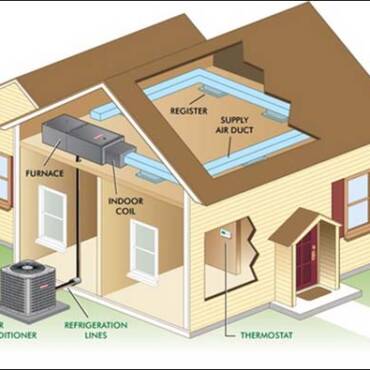Modern advancements in climate control technology have significantly improved the comfort, efficiency, and versatility of air conditioning systems. Three key features—zoning systems, humidity control, and adaptive cooling or heating—are revolutionizing how we cool or heat our homes. These features allow for more precise control over the indoor environment, tailoring comfort to individual preferences and optimizing energy use. This article explains these advanced climate control features in simple terms to help homeowners understand their benefits and functionality.
Zoning Systems: Customized Cooling for Every Room
One of the most significant advancements in air conditioning technology is the introduction of zoning systems. A zoning system divides a home into different areas or “zones,” each of which can be cooled independently. This is achieved through a combination of thermostats, control panels, and dampers within the ductwork. Here’s how it works and why it’s beneficial:
How Zoning Systems Work:
- Thermostats: Each zone has its own thermostat that monitors the temperature in that specific area.
- Control Panel: A central control panel receives signals from the thermostats and directs the HVAC system to adjust the airflow to each zone.
- Dampers: Dampers are installed in the ductwork and open or close to regulate the amount of conditioned air entering each zone.
Benefits of Zoning Systems:
- Customized Comfort: Different family members often have different temperature preferences. Zoning allows each person to set the temperature in their own room to their liking without affecting the rest of the house.
- Energy Efficiency: By only cooling the areas that are being used, zoning systems reduce energy waste and lower utility bills. For instance, you can cool or heat the living room during the day and the bedrooms at night.
- Reduced Wear and Tear: Because the system isn’t working as hard to cool the entire house all the time, it experiences less wear and tear, potentially extending its lifespan.
Humidity Control: Creating a More Comfortable Indoor Environment
Modern air conditioning units are equipped with advanced humidity control features that help maintain a comfortable indoor environment. Humidity plays a crucial role in how we perceive temperature and overall comfort. Too much humidity can make the air feel warmer and more oppressive, while too little can lead to dry skin and respiratory issues.
How Humidity Control Works:
- Dehumidification: Air conditioners naturally remove some moisture from the air as they cool it. However, units with advanced humidity control have additional dehumidification capabilities to maintain optimal indoor humidity levels.
- Humidity Sensors: These sensors monitor the humidity levels in your home and adjust the air conditioner’s operation to maintain a comfortable balance.
- Variable Speed Compressors: Units with variable speed compressors can adjust their cooling output more precisely, allowing them to maintain the desired humidity levels without overcooling the space.
Benefits of Humidity Control:
- Enhanced Comfort: Proper humidity control helps maintain a comfortable indoor climate, making the air feel cooler and more pleasant.
- Health Benefits: Maintaining optimal humidity levels can reduce the risk of respiratory issues, mold growth, and other health problems associated with high humidity.
- Energy Efficiency: By controlling humidity effectively, air conditioners don’t have to work as hard to maintain comfort, resulting in lower energy consumption.
Adaptive Cooling Systems: Smart Cooling Based on Occupancy and Activity
Adaptive cooling systems represent the cutting edge of HVAC technology. These systems use sensors and smart algorithms to adjust cooling based on occupancy and activity levels in the home. This ensures that energy is used efficiently and comfort is maintained without unnecessary waste.
How Adaptive Cooling Systems Work:
- Occupancy Sensors: These sensors detect when people are in a room and adjust the cooling accordingly. For example, if a room is unoccupied, the system can reduce cooling to save energy.
- Activity Sensors: Activity sensors monitor the level of activity in a room. Higher activity levels generate more heat, prompting the system to increase cooling to maintain comfort.
- Smart Algorithms: These algorithms analyze data from the sensors and make real-time adjustments to the cooling system, ensuring optimal comfort and efficiency.
Benefits of Adaptive Cooling Systems:
- Energy Savings: By cooling rooms only when they are occupied, adaptive cooling systems can significantly reduce energy consumption and lower utility bills.
- Enhanced Comfort: These systems ensure that rooms are always comfortable when occupied, without the need for manual adjustments.
- Convenience: Adaptive cooling systems operate automatically, providing a seamless and hassle-free cooling experience for homeowners.
Advanced climate control features such as zoning systems, humidity control, and adaptive cooling are transforming the way we cool our homes. These technologies offer customized comfort, improved energy efficiency, and enhanced convenience, making modern air conditioning systems more effective and environmentally friendly. By understanding these features, homeowners can make informed decisions when upgrading their HVAC systems, ensuring a more comfortable and efficient living environment. Give Dacs a call and see what upgrades can be achieved to enhance your current system, or consider a new fully installed system.
Whether you require installation, repair, or maintenance, our technicians will assist you with top-quality service at any time of the day or night. Take comfort in knowing your indoor air quality is the best it can be with MOE heating & cooling services Ontario's solution for heating, air conditioning, and ventilation that’s cooler than the rest.
Contact us to schedule a visit. Our qualified team of technicians, are always ready to help you and guide you for heating and cooling issues. Weather you want to replace an old furnace or install a brand new air conditioner, we are here to help you. Our main office is at Kitchener but we can service most of Ontario's cities
Source link




Add Comment